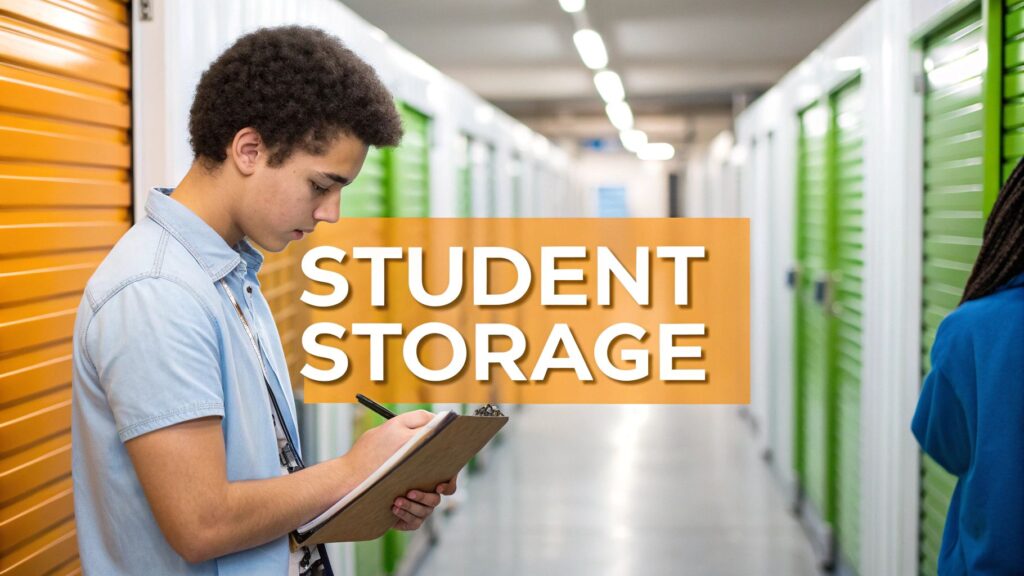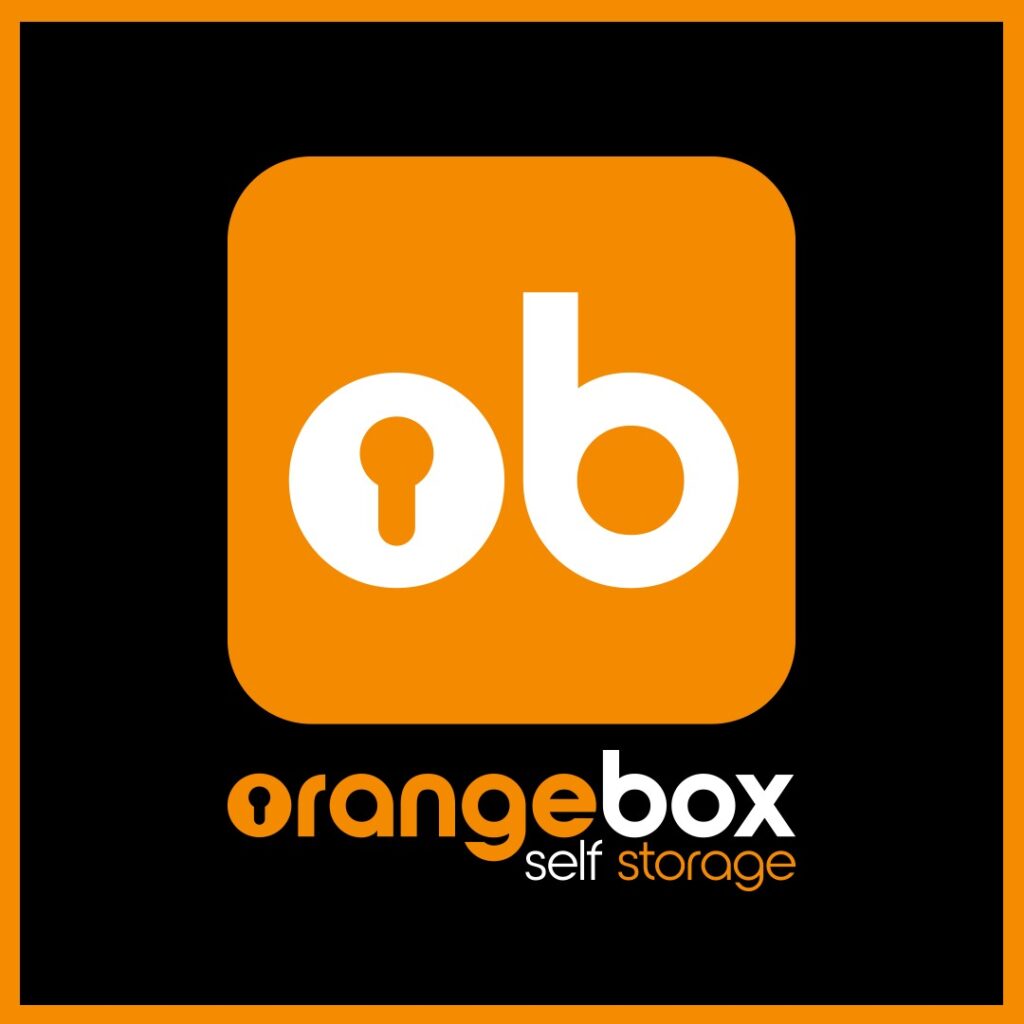The end-of-term clear-out can feel like absolute chaos. If you're currently staring at a mountain of stuff wondering where it's all going to go, trust me, you're not the only one. This guide is here to give you a practical, no-nonsense plan for finding secure and affordable student storage in the UK.
Let's get this sorted.
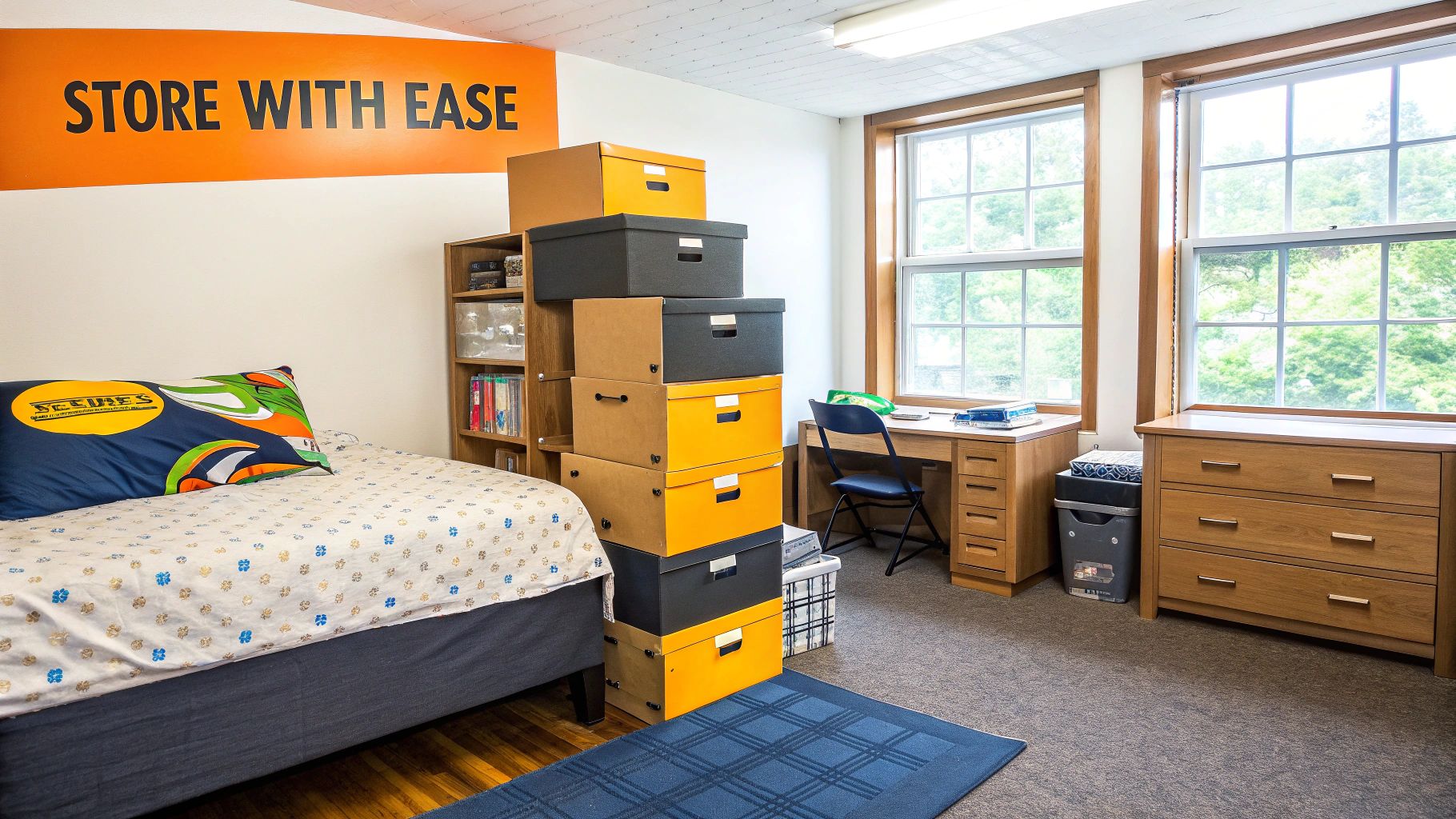
Why Smart Student Storage Matters
Moving out of halls or your shared house every year is a massive logistical headache. Lugging everything home—especially bulky things like duvets, kitchen gear, and a year's worth of textbooks—is a huge pain. It's often completely impractical, particularly if you're an international student or studying miles from home.
This is exactly why finding good student storage has become a necessity, not just a nice-to-have.
The demand for student storage is definitely on the rise. The market in the UK is projected to grow at a Compound Annual Growth Rate of 8% between 2025 and 2033. That figure alone shows just how many students are realising the benefits of having a secure local unit to stash their belongings during the holidays.
Finding the right spot is about more than just getting extra space; it's about buying yourself some peace of mind. Knowing your things are safe means you can actually switch off and enjoy your break without a single worry. For a bigger picture on student living, this complete survival guide to student housing in the Netherlands has some great insights that apply everywhere.
A good storage solution simplifies the whole end-of-term transition. It lets you focus on your exams and your holiday plans, not on packing logistics. Think of it as an investment in a stress-free break.
Consider this guide your personal checklist for making a smart storage decision. We're going to walk through:
- How to accurately figure out how much space you really need (hint: it’s almost always less than you think).
- Pinpointing the must-have features, like flexible access hours and top-notch security.
- Comparing the local options to make sure you're getting the best possible value for your money.
By the time you're done reading, you'll know exactly how to find the perfect student storage unit near you.
Getting a Handle on Your Storage Space
Before you even start Googling "student storage near me," the first thing you need to do is figure out exactly how much space you'll actually need. It’s a classic mistake to pay for a unit that’s half-empty, but it’s just as stressful to realise at the last minute that your stuff won’t fit.
The easiest way to get it right? Make a quick inventory list.
Grab a notepad or just open the notes app on your phone. Do a quick walk-around of your room and jot down everything you plan on putting into storage. To keep it from feeling like a massive task, just group things by category.
- Bedroom: Duvet, pillows, bedding, bulky winter coats, a few shoe boxes, desk lamp.
- Study: Textbooks, ring binders, printer, laptop, important files.
- Kitchen: Microwave, kettle, pots, pans, plates, cutlery.
- Miscellaneous: Small rug, sports gear, posters, laundry basket.
Just seeing it all written down takes the guesswork out of the equation and gives you a much clearer idea of what you’re working with.
What Do These Unit Sizes Actually Look Like?
Now that you have your list, it's time to translate that into a real-world space. Most students are surprised by how little room they actually need. A 10 sq ft unit, which is roughly the size of a small cloakroom, is often more than enough for about ten medium-sized boxes, a suitcase, and a small appliance like your microwave.
If you have a bit more, a 25 sq ft unit is closer to the size of a small walk-in wardrobe. This size can comfortably fit the contents of a standard uni room, including a single mattress (if you stand it on its side), a small desk, a chair, and plenty of boxes. Looking at actual storage options in Dukinfield that list their dimensions can really help you visualise the space.
Common Student Storage Unit Sizes
To make it even easier, here's a quick reference to help you visualise how much space you'll need for your belongings.
| Unit Size (sq ft) | Typical Capacity | Ideal For Storing |
|---|---|---|
| 10 sq ft | 5-10 medium boxes, a suitcase | Books, clothes, small electronics, kitchen items. |
| 15 sq ft | 10-15 boxes, a small desk chair | A bit more room for extra boxes or a musical instrument. |
| 25 sq ft | Contents of a typical student room | Single mattress, small desk, chair, multiple boxes, TV. |
| 35 sq ft | Contents of a small studio flat | Small sofa, mattress, multiple boxes, larger furniture. |
This table should give you a solid starting point for matching your inventory list to a real unit size.
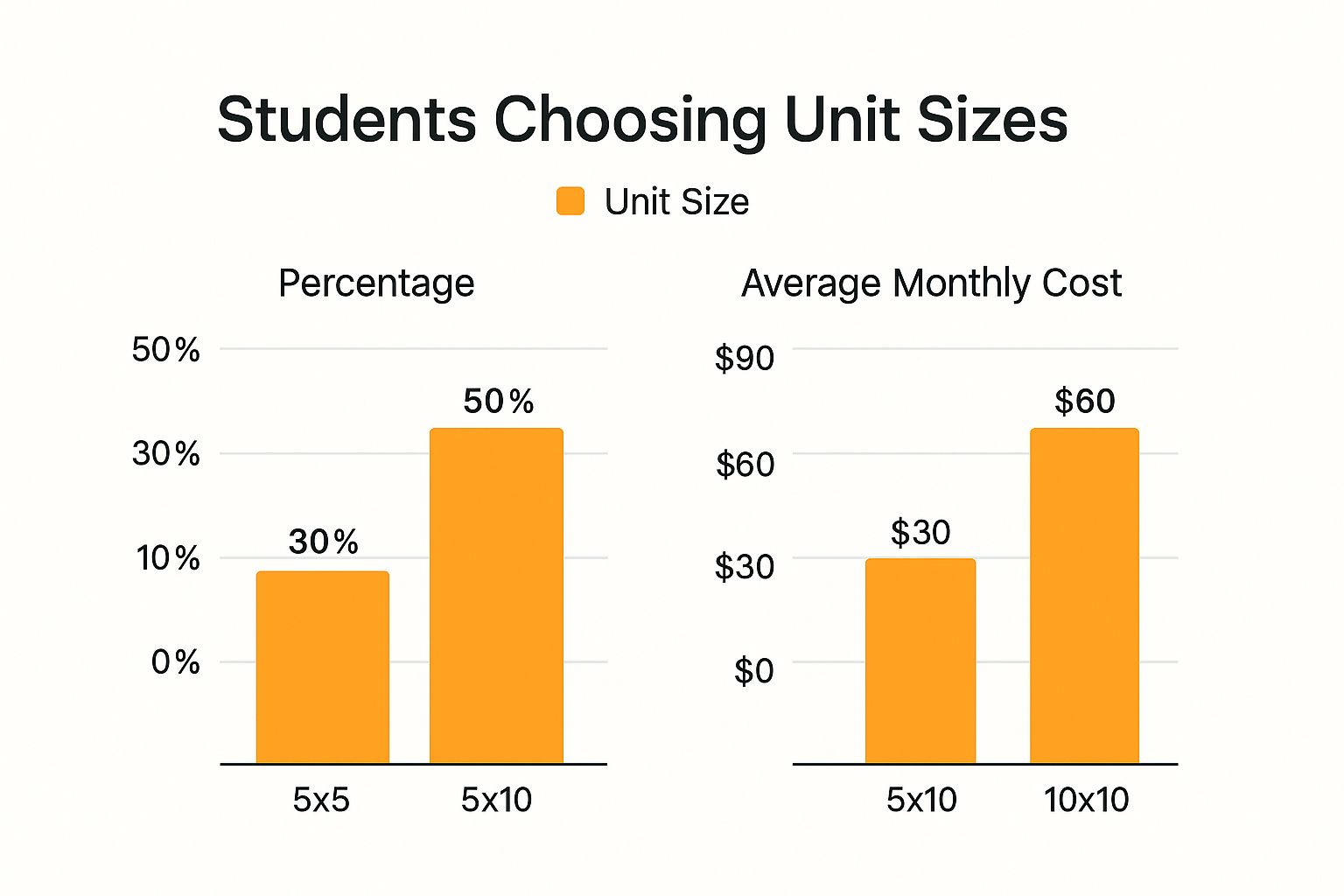
As you can see, the 25 sq ft unit is often the sweet spot, offering a great balance between capacity and cost for the average student.
Key Takeaway: Don’t just guess how much space you need. An inventory list only takes a few minutes to create and is the single best way to make sure you book the right size unit. It'll save you both money and a whole lot of stress.
How to Research and Compare Local Storage Options
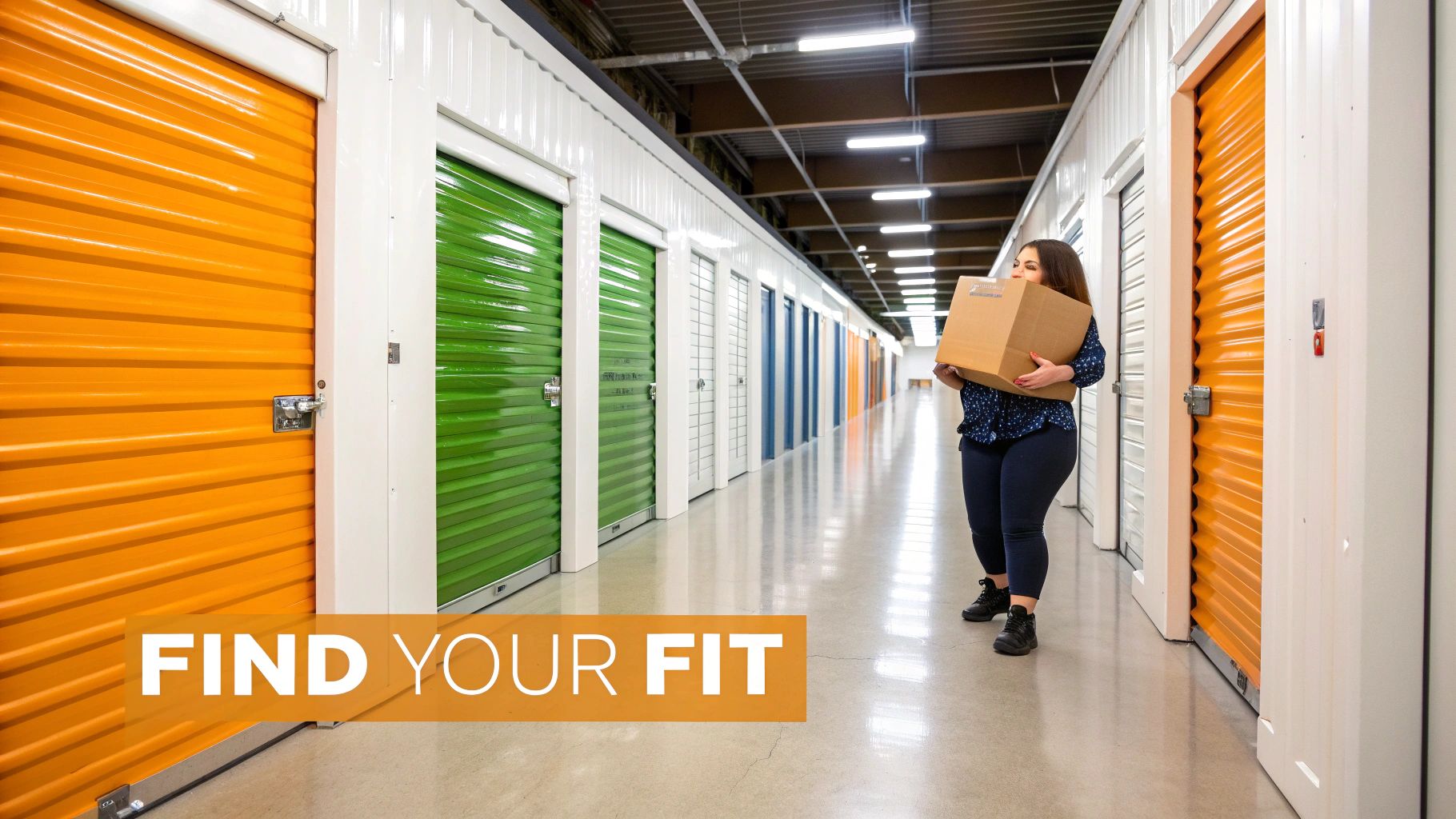
Once you've got a handle on how much space you’ll need, it’s time to find the best "student storage near me". The goal here is to move past a quick map search and build a solid shortlist of reliable, well-regarded facilities that actually fit your needs.
A smart first move is to dive into each facility’s website. Look for clear, upfront pricing and transparent contract terms. You want a company that makes it easy to understand what you're paying for, including any student discounts or special offers that could bring the cost down.
This initial digital detective work helps you quickly weed out any options that just aren't going to work.
Digging Deeper Than a Simple Search
After you've shortlisted a few places, it's time to get into the specifics. One of the most important decisions you'll make is the type of unit you choose. Knowing the difference between indoor and container storage is essential, for example. Our guide on indoor vs container storage options breaks down which is better for certain belongings.
Beyond the unit itself, you need to investigate the facility's security measures. Don't just settle for a generic mention of "security"—look for concrete details.
- 24/7 CCTV Monitoring: Is the entire facility covered, or just the entrance? You want cameras watching over hallways and access points, too.
- Individual Unit Alarms: Does each unit have its own alarm? This adds another crucial layer of protection.
- Secure Access Controls: Is entry managed with a personalised PIN code or key fob? This ensures only authorised people can get in.
Reading recent reviews from other students is invaluable. They give you the real story—honest, unfiltered insights into what it's actually like to use a facility, from how clean the units are to how helpful the staff is.
The UK's self-storage market is expanding quickly, with projections showing steady growth of around 5.5% annually between 2025 and 2030. Even though the UK has more storage space per person than other European countries, demand in university cities often outstrips supply, which makes doing your homework early even more critical.
This high demand means the best, most secure spots get snapped up fast. By comparing features and reading what others have to say, you can confidently choose a facility that gives you both great value and total peace of mind.
What to Look For in a Student Storage Facility
Finding a storage spot near campus is a great starting point, but what really matters are the features that make your life easier and keep your stuff safe. Let's be honest, not all storage places are the same, and a few key amenities can make a world of difference.
First up, think about access hours. A place offering 24/7 access gives you total freedom, which is perfect if you're pulling a late-night study session and need to drop things off afterwards. But if your schedule is pretty standard, a facility with regular business hours might be all you need—and it can sometimes be a bit cheaper too.
Security Is Non-Negotiable
When you’re storing your belongings, peace of mind is everything. A simple padlock just doesn't cut it anymore. You need to look for a place with multiple layers of security.
Here’s what a solid security setup looks like:
- Comprehensive CCTV: Cameras shouldn't just cover the entrance. Look for coverage in the corridors and loading areas too.
- Gated Access: A proper perimeter fence with an electronic gate that needs a unique code is a huge deterrent.
- On-Site Management: Having actual staff around during business hours makes a massive difference and helps prevent any funny business.
The self-storage industry is booming—in 2024, total floorspace in the UK shot up by 7.2%. This huge demand, driven partly by students, means you need to be selective. You can get more insight from the latest UK self-storage industry report.
Conveniences That Genuinely Help
Finally, it’s the little things that often count the most. Does the facility offer its own insurance plan, or do you have to sort that out yourself? Many good places require you to have insurance, but the ones that offer their own affordable plans can save you a real headache.
Don't sleep on services like collection and delivery. If you don't have a car, finding a company that can pick up your boxes for you is an absolute lifesaver. It can turn a potentially stressful move into a surprisingly simple task.
These are the features that separate a decent storage unit from a great one. For a deeper dive into finding the perfect spot, check out our guide on secure and flexible student storage in Nottingham. Focusing on these key points will ensure your belongings aren't just stored, but stored properly.
Booking Your Unit and Preparing for Move-In Day
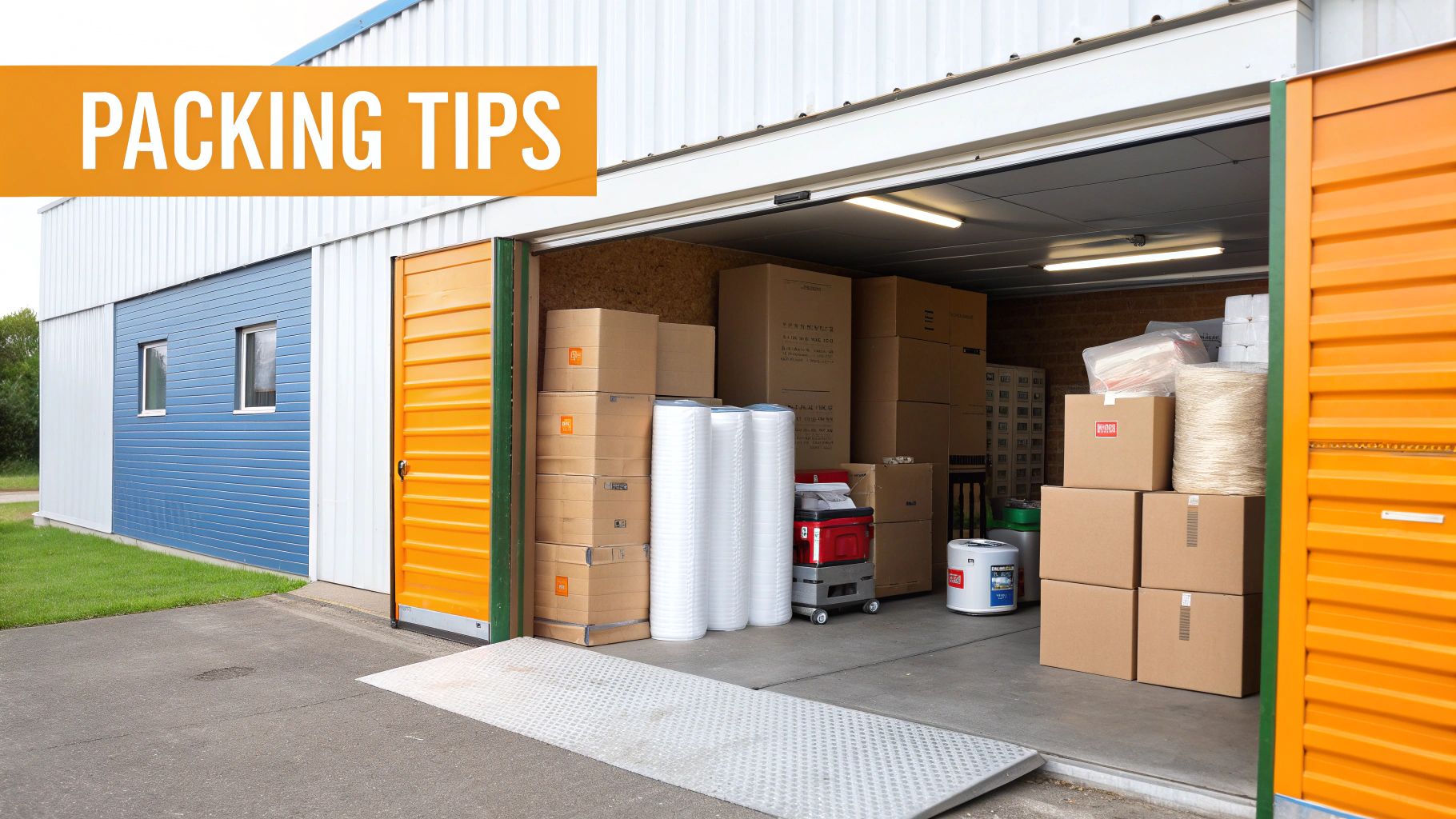
You’ve found the perfect unit—now it’s time to make it official and get ready for a stress-free move-in. The booking part is usually straightforward, but having your documents handy will speed things up considerably.
Most facilities will ask for a few key items to get your booking confirmed. It’s always a good idea to have these ready to go:
- Photo ID: A driver's licence or passport will do the trick.
- Student ID: Don’t forget this one, as it’s often your ticket to securing student-specific discounts.
- Proof of Address: A recent utility bill or bank statement usually works perfectly.
Once the paperwork is sorted, you’ll sign the rental agreement. Take a moment to actually read through it, paying close attention to clauses about notice periods or any potential late payment fees. A quick check now can prevent any nasty surprises down the line.
Packing Your Belongings Like a Pro
With your booking sorted, the final hurdle is packing. A little organisation here can transform move-in day from a chaotic scramble into a simple, efficient task. The goal is to maximise your space, protect anything fragile, and label everything clearly.
A well-packed box isn’t just about cramming more in; it’s about making sure you can find what you need later without unpacking everything. Think of it as doing your future self a massive favour.
Start by placing heavier items at the bottom of your boxes and lighter ones on top. Be sure to wrap anything breakable like plates or mugs individually in bubble wrap—or even clean clothes like jumpers and towels to save space. To make the most of every inch, stuff smaller items like socks or tea towels inside larger, hollow items such as shoes or pots. For more specific advice, you can find a wealth of information on convenient student storage solutions in Derby, which often includes packing tips tailored for students.
Finally, label every single box. Get specific—instead of just scribbling "Kitchen," write something like "Kitchen – Kettle, Mugs, Cutlery." Trust me, this small detail will feel like a lifesaver when you’re desperate for your morning coffee essentials after moving back in.
Common Questions About Student Storage
Searching for "student storage near me" can feel a bit like falling down a rabbit hole of questions. To make things a little clearer, we've pulled together the answers to the most common queries students have, from how much it costs to what you can (and definitely can't) stash in a UK self-storage unit.
Let's start with the big one: cost. Prices will always shift depending on the city and how much space you need, but you can get a rough idea. A small locker, perfect for a few boxes of books and personal bits, will likely set you back £10-£25 per week. Need to store the entire contents of your dorm room? A larger 25 sq ft unit typically runs between £20-£40 per week. Don't forget to ask about student deals—they're often available!
Another thing that trips people up is insurance. It's almost always a requirement. Most storage places will offer their own policy, but it's worth checking your parents' home insurance first. Sometimes, it covers belongings stored away from home, which could save you a bit of cash. This is just one of the many benefits of renting versus owning certain services—in this case, flexible storage over other solutions.
What Is Not Allowed in Your Storage Unit
There are some pretty strict rules about what you can store, mainly for safety and legal reasons. Getting this wrong is a rookie error, so it pays to know what to leave out of the packing boxes. To steer clear of other simple slip-ups, check out our guide on common storage unit mistakes and how to avoid them.
Here’s a quick rundown of the usual no-go items:
- Perishables: Anything that can go off, basically. No food, as it's an open invitation for pests.
- Flammable or Explosive Materials: This is a big one. Think aerosol cans, fuel, paint, and fireworks.
- Living Things: It might sound obvious, but no pets or plants are allowed.
- Illegal or Stolen Goods: Storing anything illegal is strictly forbidden and will land you in serious trouble.
Always double-check the facility's specific list of prohibited items in your rental agreement. It's much better to be sure than to accidentally break the rules and risk your deposit—or worse.
Ready to secure a safe and affordable space for your belongings? Orange Box Self Storage offers flexible, secure student storage solutions designed to fit your needs and budget. Book your unit online in minutes at https://orangebox-selfstorage.co.uk.

